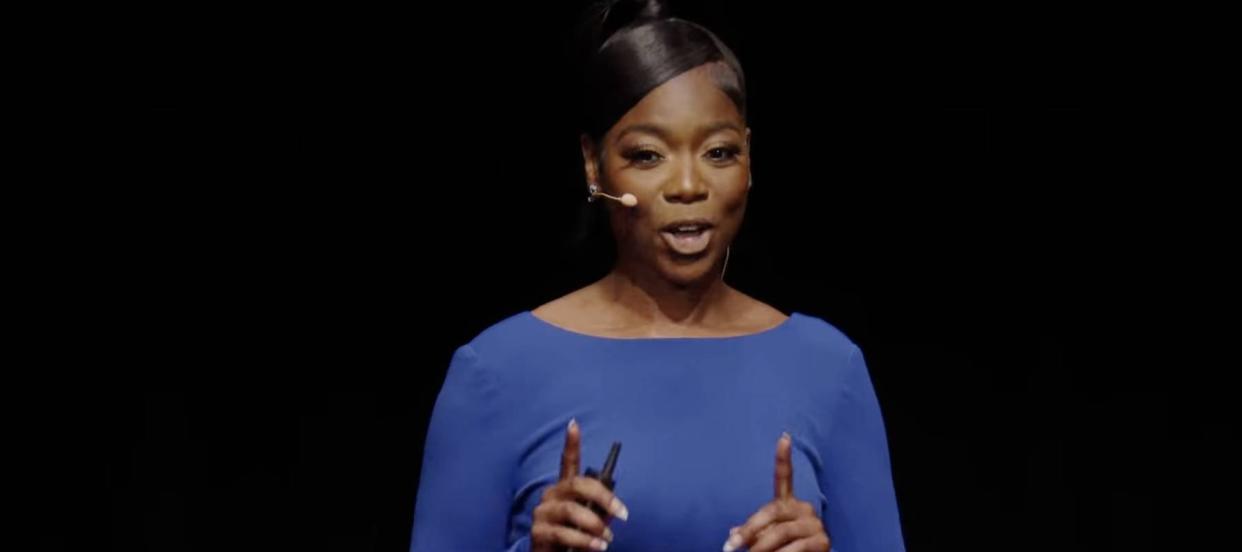‘The American dream is real estate’: This Atlanta entrepreneur has found a small solution to the US housing crisis — but millions are still falling through the cracks. Here’s why

Precious Price, a 27-year-old entrepreneur from Atlanta, is tackling one of the country’s biggest problems with a tiny solution.
Price originally bought a three-bedroom home in Atlanta back in 2019 with the aim of renting out the spare rooms on Airbnb. She eventually built a 296-square-foot tiny home in her backyard and chose to live there while she rented out her primary home.
Don't miss
Thanks to Jeff Bezos, you can now use $100 to cash in on prime real estate — without the headache of being a landlord. Here's how
Commercial real estate has outperformed the S&P 500 over 25 years. Here's how to diversify your portfolio without the headache of being a landlord
‘It makes an enormous difference’: Warren Buffett says this simple ‘trick’ is the key to earning a generous retirement nest egg
And it paid off: Price was soon able to buy another property, which allowed her to move on to renting out apartments in Atlanta’s Midtown neighborhood and eventually leave her full-time consulting job.
But now she’s found a way to give back through her lucrative side hustle, by winnowing down her portfolio and focusing on offering long-term rentals to those in need.
“My plan is to get a property I would be able to do some kind of housing on so I’m not just taking housing, but would be able to make more housing,” Price said in a recent interview with The New York Times. “The American dream is real estate.”
How Price is using tiny homes to combat the housing crisis
The American dream might be real estate, but for many hopeful homebuyers, it’s turned into a fantasy. The U.S. is facing a supply shortfall of 6.5 million single-family homes, according to the National Association of Realtors. And due to the reduced inventory, over three-quarters of market listings are too expensive for even middle-income buyers — which has also driven up rent.
“I wanted to be part of the solution,” Price said in a Tedx Talk. “One that properly balances capital gain and social gain.”
In her talk, Price explains the housing-insecure — or the “hidden homeless” — can include single parents who can’t afford rent, couchsurfing college students and individuals who don’t have access to basic indoor plumbing.
She prioritizes renters in need, including students, health care workers and seniors, and plans on acquiring more properties that have enough land to support accessory dwelling units (ADUs), which she intends to make available to tenants on a long-term basis.
Price urges existing homeowners to consider transforming their spare lots or space in their backyards into affordable rentals as well. She even founded a startup, Gather, to support people building their own tiny homes in increasing the value of their properties and generating income.
“In the midst of hustle culture, it’s easy to let the relentless pursuit of capital gain overshadow the basic human right to affordable, adequate housing,” Price says in her talk.
And she isn’t the only voice calling for the use of tiny homes to support the housing-insecure. Reports show tiny home villages have been popping up across the country, from California to Oregon, as a means to support homeless populations.
Read more: This janitor in Vermont built an $8M fortune without anyone around him knowing. Here are the 2 simple techniques that made Ronald Read rich — and can do the same for you
Can tiny homes actually resolve the housing crisis?
As for whether they’re a solution to the housing crisis, things get a little more complicated. Getting your hands on an ADU is the easy part. You can even purchase tiny home kits from the Home Depot for somewhere between $30,000 to $60,000 on average, according to an article from Rocket Homes.
But then you’ll need land and a permit before you can start construction — and then you’ll need to consider factors like plumbing and electricity. However, even with tiny home villages, NPR reports some are located in remote parts of town (far from jobs and amenities) and come with limited facilities. And zoning restrictions, building codes and opposition from neighbors have prevented these communities from getting built in certain cities as well.
And while these minuscule homes may support single renters, they can’t accommodate, say, a four-person household.
Price doesn’t believe housing insecurity can be overcome entirely by real estate entrepreneurs either, and she advocates for collaboration between policymakers, nonprofits and entrepreneurs.
And the experts agree. Many have pointed out that these units don't provide a long-term solution to the housing crisis.
Donald Whitehead Jr., executive director of the National Coalition for the Homeless, told NPR he thinks tiny homes are a good emergency option — to shelter people from the elements and violence — but in order to actually get to the root of the problem, there needs to be more living-wage jobs, housing inventory and funding for housing vouchers.
What to read next
Are you ready for your first year of retirement? Here are 4 things you might not expect — but definitely need to prepare for
Jeff Bezos and Oprah Winfrey invest in this asset to keep their wealth safe — you may want to do the same in 2023
Here's how much money the average middle-class American household makes — how do you stack up?
This article provides information only and should not be construed as advice. It is provided without warranty of any kind.
